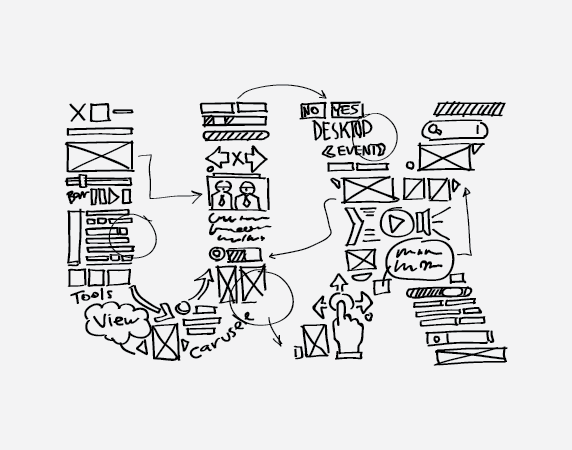The Seven Point CheatSheet for Building a Successful Mobile App
Mobility is booming. The number of mobile users worldwide touched 4.43 billion in 2015, and the figure is expected to reach 5.07 billion by 2019.
The rise of mobility has corresponded with a surge in demand and acceptance of mobile apps. However, expecting a free ride by conjuring up a namesake app is asking for trouble.
Enterprises have no option these days but to roll out mobile apps for the convenience of their internal users and employees, but success demands such apps be of high quality and have a high degree of user adoption. Here are some tips in the direction.
1. Get the Basics Right
When it comes to mobile apps, the first degree of association is with a responsive design, where the format adjusts automatically, to suit the highly fragmented screen size of mobile devices. However, responsive design is now the basic requirement, as is effective planning on the scope of the app, and creating a prototype.
It requires much more effort that such basics to build a successful mobile app.
2. Never Compromise on the UX
The best apps are well designed, both in terms of visuals and the user experience (UX).
Never underestimate the power of simplicity. A simple, neat and clean interface best suits most mobile devices, with its small form factors. Simplicity is not just in the design, but also in the feature list. Make sure to eliminate any unnecessary feature, and make everything clearly visible. Even subtle changes in design make a big difference in usability.
The best UX design is also relative to the platform. Each platform has a native way of screen layouts, displaying information, and navigation. For instance, iOS tabs have a built-in NavigationController, facilitating multiple levels of navigation inside each tab. Android tabs, on the other hand, are shallow, and have no in-tab navigation. Trying to implement iOS-like functionality in Android, such as in-tab navigation leads to confusion, and is counterintuitive.
3. Focus on a Specific Function
The biggest mistake related to mobile apps is considering the app as a micro version of the website. The most successful apps cater to a specific function or niche. It solves a specific problem or does a limited number of things, but enables doing it well. For instance, a field service app makes the life of a field service technician easier, by allowing her to download the relevant inspection forms, access information related to the plant she is visiting, and connect with external help for real-time troubleshooting. Saddling the app with unnecessary features such as customer care, sales reports and more would only serve to make the app bloated, harder to use, and counter-intuitive.
At the same time, make sure every single enterprise app is part of a wider mobile strategy, and as an opportunity to engage with customers, be it external customers or internal customers, in a better way. Spend time on the purpose of the app, making sure it serves a specific purpose that is needed in the first place. Also, make sure each app is a vital spoke, and all apps added together to complete the comprehensive whole in organizational functionality.
4. Leverage the Features of the Mobile
Unlike websites, a mobile app has the capability to push information to users, leveraging geolocation services to offer improved services, adjust to slow data speeds and overall offer a dynamic and proactive experience for users. Such options unlock new possibilities and go a long way in ensuring the success of the mobile app. Effective Planning is critical in adding such rich functionality to make apps more useful.
5. Get the Development Right
Many a time, apps are rushed into the market, without adequate testing, since the app would be needed desperately. An imperfect or half-baked app is more likely to do more harm than good, by impeding productivity. Follow agile development procedures to develop the app well first time round.
Make sure to test often. Discovering the font positions are off, or the app simply crashing on loading, after spending weeks on development, is a recipe for disaster. Very often the solution at such an advanced stage of development would be ineffective quick-fixes which will lead to the failure of the app. Frequent testing enables identifying the problem and affecting a fix immediately before discovery or fix becomes too difficult.
The coder, the tester, and all other stakeholders connected with the app development process would do well to consider themselves as end users, and see how the apps pan out when using it. It is also a good idea to involve the actual end user in the development process.
6. Enable Platform-Agnostic Development
Android is now the dominant platform with over 50% market share in most markets. The iPhone is popular for enterprise users as well. BYOD, which is prevalent in many enterprises make the mobile screen hopelessly fragmented though, with varying screen size and OS variants. In such a state of affairs, trying to optimize for specific platforms is asking for trouble. The best practice in cross-platform development is to build the code completely abstracted, as if it is a local web service. Make programming modules platform-agnostic by making programming logic independent from the screens and platform in which it will run. Such an approach will also enable code reuse, accelerating the code development process. With the logic decoupled from the platform, only the user interface code need to be built separately for each platform.
The best practice in cross-platform development is to build the code completely abstracted, as if it is a local web service. Make programming modules platform-agnostic by making programming logic independent from the screens and platform in which it will run. Such an approach will also enable code reuse, accelerating the code development process. With the logic decoupled from the platform, only the user interface code need to be built separately for each platform.
7. Track the App Effectively
An app development project is not one-off but a continuous process of evolution. Use tools to track whatever is happening inside the apps, such as what users click and use, traffic sources, and other parameters, to fine tune the app during the next release. Use the first batch of users to test metrics and understand the real value of each user, before continuing with more systematic campaigns.
The mobile space is highly fragmented, and it requires a high degree of expertise to roll out successful apps. A successful app invariably involves a great deal of experimentation and trial-and-error. Partnering with us would allow you to gain from our experience and expertise in developing hundreds of highly successful enterprise apps, cutting across industries. We have done the hard grind, understanding what works and what does not work. When you partner with us, you get things done easily without having to go through the painful trial and error yourself.
Stay up to date on what's new

Recommended Posts

22 Nov 2022 B2B
React Native, Flutter, Ionic, Xamarin – A Comparison Between The Top Mobile App Development Frameworks
Frameworks are the backbone of mobile app development. They are essential to building dependable apps quickly. When choosing a framework, you can choose between native or cross-platform applications. Though both……

15 Feb 2021 Retail
Building a Business Mobile App in 2021? Here’s What You Need to Know
Mobile application development is the #1 priority for businesses and enterprises in 2021. Are you well-equipped to plan your requirements and develop a robust business mobile app? Mobile app development……

22 Aug 2019
How Artificial Intelligence Is Enhancing Mobile App Technology
Five Ways AI Is Accelerating Mobile App Technology Artificial Intelligence (AI) has permeated the tech world. It is enhancing everything from your car to your toothbrush. It is influencing the……

04 Jun 2019
Artificial Intelligence For Intelligent App Ecosystem
Key Features And Benefits Of An Artificially Intelligent Ecosystem For App Development Artificial Intelligence is omnipresent in this digital era. Artificial Intelligence and human intelligence work together to deliver numerous……
Featured Blogs
Stay up to date on
what's new












